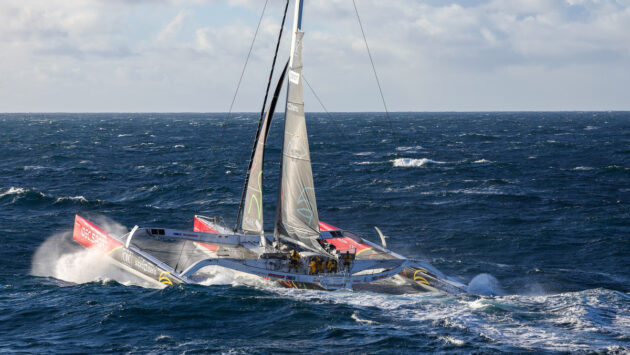The Famous Project CIC, an all-women challenge for the Jules Verne Trophy, the non-stop around the world record, set off on Saturday 29 November.
The Famous Project CIC, the all-women challenge for the Jules Verne Trophy, the non-stop around the world record, departed on Saturday 29 November.
The team, which is skippered by French former Vendée Globe skipper Alexia Barrier and was set up together with British record-breaking yachtswoman Dee Caffari, is aiming to become the first all-female crew to complete a Jules Verne attempt.
But above all they are chasing one of the all-time great sailing records, the non-stop, no-holds-barred around the world record time, which currently stands at 40 days and 23 hours, set by Idec Sport in 2017.
As Dee Caffari posted on her Facebook page: “Sh*t is about to get real!”
Barrier and Caffari are racing with Annemieke Bes, Rebecca Gmuer, Deb Blair, Molly Lapointe, Xiquita Etchegoyen, and Stacey Jackson aboard Idec Sport, the same maxi-trimaran which set the current Jules Verne record in 2017, skippered by Francis Joyon.
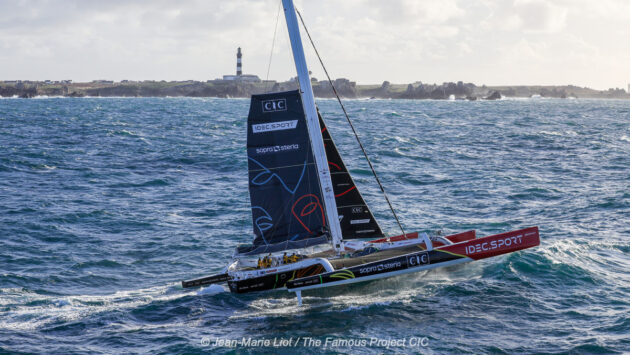
The Famous Project CIC, 100% women crew, crossing the start line for Trophée Jules Verne on November 29, in Brest, France. Photo by Jean-Marie Liot / The Famous Project CIC
Starting a Jules Verne challenge
The Jules Verne Trophy has an official start/finish line between the Créac’h lighthouse on the island of Ouessant, France, and Lizard Point lighthouse on the southernmost tip of England.
Crews must sail around the world, passing Cape of Good Hope, Cape Leeuwin, and Cape Horn to port, before crossing the same line in the opposite direction to finish – a ‘great circle’ distance of 21,760 nautical miles (40,300km).
But the Jules Verne has no set start time, so teams may leave whenever their weather routers believe a suitable window of opportunity for a fast Atlantic descent is opening up.The Famous Project first moved to what’s known as ‘Code Green’, or ready to depart. Having left Brest, they crossed the line at 01.40 UTC (14 h 40 FR) on Saturday, November 29.
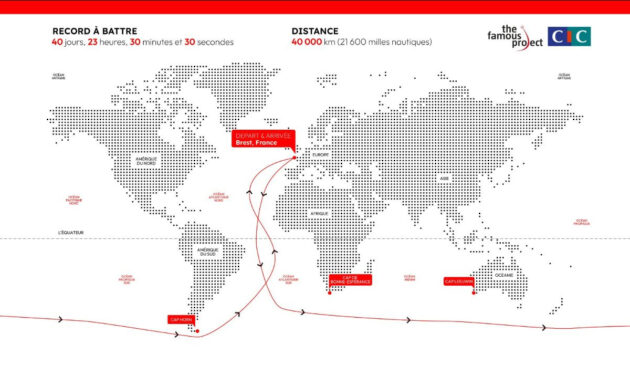
The Jules Verne Trophy course
Toughest 24 hours at start
The Famous Project crew set off in tough conditions with a blustery north-westerly, and will immediately face 4-5m waves in the Bay of Biscay.
“I feel very lucky and grateful for all the work that has been done over the last few months and years, all together. It’s really a collective celebration to be at the starting line,” said Barrier.
“Obviously, I’m a little nervous because what we’re doing is huge. But what reassures me a lot is having these incredible girls by my side. I’m not alone and I know my team is up to the task.
“We’ll be sailing downwind until we reach the equator. These are conditions we know well. Further on, the doldrums are still shifting.
“As Brian Thompson, who has helped us a lot throughout this training course on trimarans with the girls, would say, ‘You’re going to experience the toughest 24 hours of your Jules Verne Trophy.’ So we need to stay focused and conservative so we don’t hurt ourselves or break anything on the first day.”
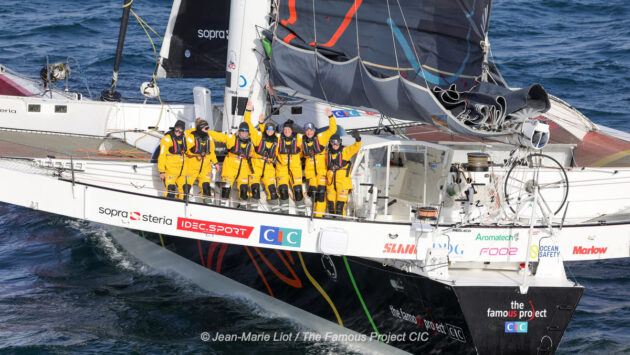
Boat and crew of The Famous Project CIC, 100% women crew, before start for Trophée Jules Verne on November 29, in Brest, France. Photo by Jean-Marie Liot / The Famous Project CIC
“I’m surprisingly calm, but I think I’m calm to help everyone else, because you can feel a certain nervousness,” said Dee Caffari on the morning of the start.
“The main goal has always been to get to the starting line, and I think today we took a big step forward. It’s an important milestone, and I think it deserves a little celebration.
“It’s been a long road, with ups and downs, but Alexia never lost confidence or faith in herself, and I supported her throughout. So I’m very happy to be here. Today it’s about reminding the girls that we’re just going to sail, which is what they do perfectly, but simply that they won’t be sleeping in a bed for a few days. That’s exactly what we practiced in training, so we’re just going to set off, enjoy ourselves, and do what we know how to do.
“We wanted a perfect start, but perfection doesn’t exist in sailing, because we’re at the mercy of Mother Nature. That said, it’s a very good start.”
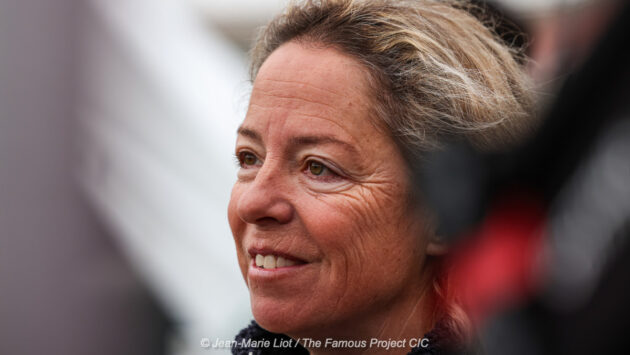
Skipper Alexia Barrier (FRA) before start of The Famous Project CIC attempt on the Trophée Jules Verne. Photo by Jean-Marie Liot / The Famous Project CIC
Jules Verne weather window
Ashore the team is supported by meteorologist Christian Dumard. The circulation of two high pressure systems over the North Atlantic has created an opportunity for a starting window, though the team will have an immediate race against time as the movement of an anticyclone threatens to close the route off Cape Finisterre.
“The front will pass over the starting area on Saturday morning,” explains Dumard. “The idea is to leave just behind it, in the early afternoon, in a north-westerly wind of less than 30 knots, which will gradually weaken.
“This window is very short and does not necessarily offer an absolute chance of achieving a ‘blistering’ time at the equator. But it does offer favorable wind and sea conditions for downwind sailing and a relatively comfortable start for the crew.”
“We will leave Brest on Saturday before noon and cross the line about two hours later. There will be rough seas, with swells of over 4 meters, which are perfectly manageable aboard Idec Sport,” adds Barrier.
“The danger is that the high-pressure system centered off the coast of Portugal will grow and block us as we pass Cape Finisterre. We would then have to turn back and resume our standby in Brest.”
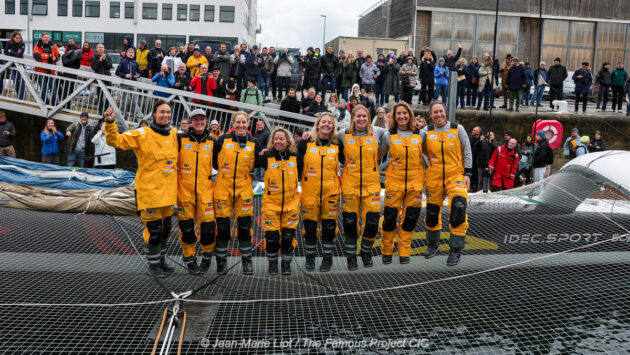
A big crowd turned out to see the crew of The Famous Project off from Brest. Photo Jean-Marie Liot/The Famous Project CIC
All-female team
The Famous Project was launched in 2022, with the team initially training in a MOD70 before taking delivery of Idec Sport. They have been working with round the world yachtsman Brian Thomspon, with fellow British ocean sailor Jonny Malbon the Team Director.
In a recent blog post, Dee Caffari reported that the team’s final training sessions in late October ahead of the record were both invaluable, and challenging.
“These training sessions are where theory meets reality – intense, demanding, and absolutely invaluable.
“We were fortunate to train with Brian Thompson, whose expertise and calm authority at sea are second to none. Brian’s coaching has helped us fine-tune our performance and strengthen our team dynamics – those crucial marginal gains that will make all the difference when we take on the planet’s toughest challenge.
“This month, Mother Nature decided to push us harder. The conditions were significantly bigger and stronger than what we experienced during the summer -exactly what we needed. It’s one thing to sail fast in perfect conditions; it’s quite another to maintain that performance when the waves are towering and the wind is howling.
“These challenging sessions gave us a much more realistic preview of what life will really be like as we chase the record around the world.”
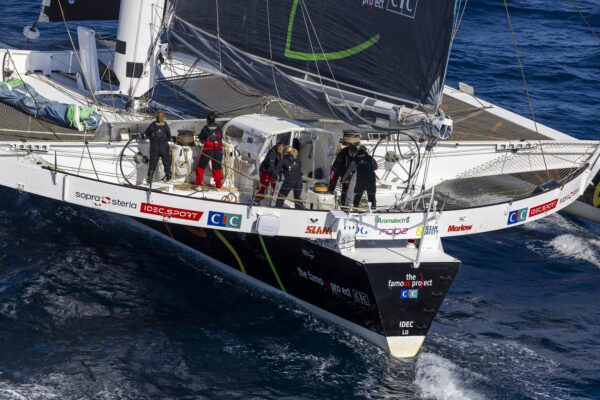
Skipper Alexia Barrier and his crew training onboard the Maxi-Trimaran The Famous Project CIC, off Groix island. Photo: Jean-Marie LIOT / The Famous Project CIC
Jules Verne attempts
There have been numerous attempts on the Jules Trophy record since Joyon set the current record in 2017. That time of 40 days, 23 hours, 30 minutes requires an average speed of 22.84 knots.
The foiling Ultim trimarans – capable of maintaining consistent speeds in the high 30s – have set off several times. In 2024 Thomas Coville’s Sodebo and Francois Gabart’s SVR-Lazartigue started within hours of each other, but both had to pause their attempt after damage or gear failure. Sodebo restarted last winter, but later had to retire after losing their central rudder.
In 2020, Charles Caudrelier’s team on Gitana 17 and Sodebo also set off in the same weather window in late November, but both had retired by mid-December after colliding with underwater objects.
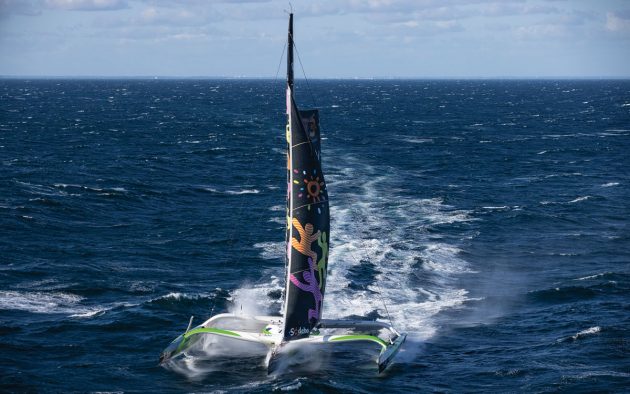
Sodebo is among the Ultims that has made numerous attempts at the Jules Verne Trophy. Photo: Pierre Bouras/DPPI
The last all-female attempt on the Jules Verne, Tracy Edwards’ Royal & Sun Alliance in 1998, ended when the 92ft catamaran dismasted in the South Pacific 2,000 miles off the coast of Chile.
Idec Sport, the trimaran the Famous Project CIC crew are sailing, is a non-foiling design that was originally launched in 2006 as Groupama 3, and won the Jules Verne Trophy in 2010, skippered by Franck Cammas. While its peak speed is less than that of an Ultim, it is a robust and well-proven boat which has successfully completed multiple non-stop around the world passages – the first challenge of any Jules Verne attempt.
How to follow The Famous Project Jules Verne bid
You can follow The Famous Project’s attempt at thefamousproject.io
The team also has an app, active social media, and plan to share live daily updates on their YouTube channel.




